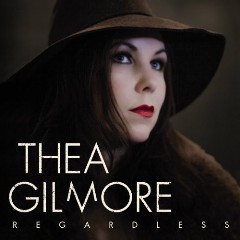Thea Gilmore – Regardless (2013)
Thea Gilmore – Regardless (2013)

1 Something To Sing About 3:07 2 This Is How You Find The Way 3:43 3 Regardless 3:43 4 Spit And Shine 3:46 5 I Will Not Disappoint You 4:01 6 Start As You Mean To Go On 3:35 7 Punctuation 5:26 8 Love Came Looking For Me 3:30 9 This Road 4:01 10 Let It Be Known 4:44 11 My Friend Goodbye 3:49 Paul Beavis Drums, Percussion Che Beresford Drums Tracey Browne Percussion, Vocals Steve Butler Vocals Dale Culliford Cello Thea Gilmore Composer, Primary Artist, String Arrangements, Vocals James Hallawell Organ (Hammond) Liz Hanks Cello Nikolai Torp Larsen Keyboards Dan Logan Percussion Alan Lowles Accordion, Bass (Upright) Robbie McIntosh Guitar Susannah Simmons Violin Sarah Brandwood Spencer Violin Alex Stemp Violin Nigel Stonier Bass, Bass Harmonica, Composer, Cuatro, Guitar, Keyboards, Ukulele, Vocals (Background) Simon Turner Cello Pete Whitfield Violin
Poor old Thea Gilmore. She's been described as "the most coherent, literate and charged British singer-songwriter of her generation" by Mojo magazine, and is championed by famous faces from Bruce Springsteen to Martha Wainwright. But she's never quite managed to navigate that tricky jump from next big thing to the thing itself. It's a shame, because live she's a musician of searing talent.
The 33-year old's new album, Regardless, offers a different mood to her earlier work; lush and orchestral, with a particular emphasis on strings. Her band at the intimate Queen Elizabeth Hall numbered no less than 10, and it was to Gilmore's credit that her voice was carried, rather than buried, by the vast array of instruments surrounding it.
And what a voice she has. Liquid and rich, it jumped seamlessly across styles, albums and decades - from the Depression-era cover Brother, Can You Spare a Dime? to what she jokingly referred to as her "power pop anthem," the impassioned Start As We Mean to Go On. One of the highlights of the evening was when she cleared the stage to stand illuminated in a single shaft of white light, and sang The Amazing Floating Man: a haunting treatment of the financial crisis which didn't make the cut of her latest album, but was a perfect showcase for her vocals. The only number which struck a dud note was new song Spit and Shine - a sarcastic dig at middle-class globetrotters which, in comparison to the honest, raw feel of most of her performance, felt over-egged.
Gilmore's early albums were marked by intelligent, often biting lyrics, and a sense of sadness and wisdom that belied her years. Her new material hasn't completely lost that old potency, but is tempered with a rousing, light-at-the-end-of-the-tunnel optimism - "I laughed at the starry-eyed /the cynics called me over-qualified/it all went wrong when you came along" as she sang gutsily on Love Came Looking for Me - that was infectious. The predominantly middle-aged audience was a little on the sedate side when it came to responding: at one point, the leather-jacket clad singer peered out with mock-concern to joke "Are you okay?" But her listeners clearly loved her, and she had a quietly confident rapport with them throughout.
Gilmore has always been proud of her independent status. She writes on her website of turning down various major labels, and it's no surprise she chose to include old favourite Mainstream ("Are you going to swim the mainstream? Or are you going to make that lightning?") on the setlist. Although her new music feels a touch more commercial, the answer to her question is still probably no: she won't be joining the mainstream any time soon. But she might not be making such excellent music if she was. ---Leah Hyslop, telegraph.co.uk
download (mp3 @320 kbs):








